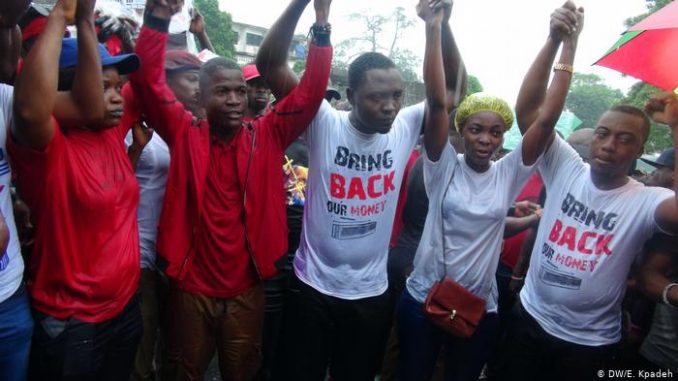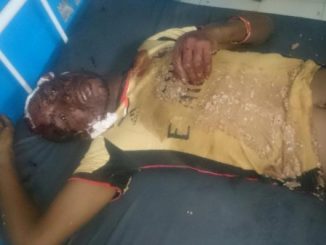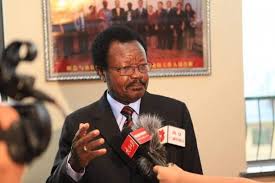
Today, Friday June 7, 2019 , Liberians will be staging a massive demonstration against the Government of President George Weah. The Council of Patriots association will be holding this “Save the State” protest. According to the Liberian media , Liberians are accusing President Weah of damaging the economy, corruption and violation of the 1986 Constitution of Liberia. They say that President Weah has also “callously” undermined all of the country’s transparency and integrity institutions.
Neighbouring Sierra Leone faces a worse political storm with the country at edge a week after public clashes between the supporters of the opposition APC and the Police who fired bullets and teargas into the party’s office at Brookfields in Freetown . President Bio is similarly accused of trashing the economy, the constitution, the rule of law and engaging in rampant tribalism. Sierra Leoneans in the UK during the past days had been picketing the hall where President Maada Bio is attending in London
Now, The United States Department of State Bureau of Diplomatic Security (OSAC) in an assessment on Liberia entitled Liberia Demonstrations Underscored Grievances & Limited Government Capacity, has predicted ,among other things, that the Liberian demonstrations today could have a copy-cat effect on Sierra Leone. See shaded sections below.
Executive Summary
“The Council of Patriots,” a coalition of five major Liberian opposition parties has called for large-scale “Save the State” demonstrations on June 7 to demand government reforms to improve living conditions and good governance as the country grapples with economic stagnation and widespread corruption. Although protest organizers have stated their non-violent intent and clarified that they are not calling for President George Weah’s resignation, many who oppose the demonstrations claim that they could serve as a ploy to force the President to step down just a year into his term. A number of civil society organizations have discouraged participation in the demonstrations, including Yana Boys and Girls clubs (panhandlers associations) and some religious leaders.
As routine, the government has augmented security in Monrovia. Pro-government actors might call on supporters to stage counter-rallies, which could increase the potential for clashes with security forces and rival protest groups. Local security force and emergency response to large-scale and widespread demonstrations remains largely un-tested in Liberia’s post-conflict era, and local capabilities are already limited. Reports indicate that the government and opposition leaders are engaged in negotiations, but it appears they have yet to reach an agreement.
Monrovia’s Capitol area will likely be the main gathering point for June 7 demonstrations, but protests could occur elsewhere in the city or the country. According to some estimates, participants could number in the thousands in Monrovia – a size which is unprecedented in Liberia’s post-conflict era. Sources suggest that protest leaders may have traveled throughout Liberia to promote support for demonstrations in other parts of the country as well. Large gatherings can materialize with little notice and escalate to violence in Liberia, and vigilantism and mob justice is common in Liberia particularly in rural areas. Members of the Liberian diaspora are reportedly organizing a June 7 protest in Washington, DC in solidarity, which could raise the profile of these protests and sustain their momentum.
Security managers should review their security measures and ensure they account for potential for protests to turn confrontational, be prolonged, and increase future tensions. The government’s reaction and demonstrators’ orderliness will play a major role in determining scale, duration, and escalation to violence of these protests. There are some private-sector concerns about the potential for June 7 to prompt sustained or recurring unrest, given their potential to tap into a confluence of economic and political trends that could cause potential regional spillover or prompt ghosts from Liberia’s conflicted past to reemerge.
Could Protests Transform a Political Turning Point into a Tipping Point?
Joint calls for demonstrations could mark the opposition’s attempt to galvanize rising and increasingly widespread popular grievances against the President and his party. So far, the central government has largely avoided addressing the looming protests publicly. The government has barred the media from reporting on the progress of government negotiations with the opposition. Open sources indicate that the government’s silence has augmented public anxiety.
The current president, George Weah, was elected in Liberia’s 2017 Presidential election, beating then-incumbent Vice President Joseph Boakai, in a run-off. Weah ran as an outsider and championed a platform of poverty reduction, economic growth, infrastructure development, and anticorruption. As a result, protests could serve as a one-year review of Weah’s performance in office and ability to meet his campaign promises. In addition, former VP Boakai is one of the leaders of “Save the State” protests; his active role in organizing the demonstrations could indicate his intention to establish himself as the opposition frontrunner for 2022 Presidential elections, as well as the opposition’s desire to continue sparring with Weah over the course of his first term. The 2017 election also marked the country’s first postwar peaceful transition of power, which could mean that sustained unrest against Weah could escalate into a referendum on the success of Liberia’s post-conflict democratic progress.
How unified the opposition becomes, and whether the coalition is able to galvanize widespread and sustained support remain to be seen. Unarticulated grievance-based and/or antigovernment movements can be prone to volatility and devolution; opposition leaders have provided participants with an outlet to express their grievances, but limited guidance on how to direct this expression. In such cases, score settling, scapegoating, predation, mistargeting, and/or indiscriminate violence could occur – all of which have implications for private-sector security, as they could lead to organized or ad hoc targeting as well as indiscriminate violence. In addition, there is concern that political elites could tap into criminal elements, youth gangs, vigilantes, and/or armed groups resurrected from Liberia’s past conflicts – any of which could morph into an armed political opposition.
Rising Economic Desperation Mixes With Unmet Expectations and High Crime
Liberia’s economic situation is the worst it has been in the past decade, as the country struggles with high unemployment, price inflation, and fuel price hikes which have caused commodities to skyrocket. The exchange rate has been the highest and most volatile it has been during peacetime. One of the largest foreign direct investors and employers in Liberia has announced layoffs due to lackluster profitability. The layoffs could result in backlash, and could hurt the nation’s economy even more. All of these developments exacerbate economic instability and desperation as Weah pushes economic growth and poverty-reduction agendas, which were major pillars of his 2017 presidential platform.
On May 28, Weah announced a massive reshuffle of the central bank – a move that could be an attempt to mollify the public in advance of June 7. Systemic corruption in government (including the central bank) has become a growing source of discontent under both the previous and current administration. In September, Liberians staged “Bring Back Our Money” protests after more than $100 million in newly printed bills vanished; and the suspicious incident undermined anticorruption efforts. Austerity may also be on the horizon for Liberia, which would impact Weah’s ability to meet his campaign promises and constrain public services further, likely resulting in public outcry.
Worsening poverty and a lack of any social safety net has led to upticks in crime and the proliferation of gangs, as people turn to illicit activities for sources of income. Opportunistic criminal actors may exploit periods of heightened uncertainty, particularly outbreaks of unrest and changes in security force posture, to expand their activities. The myriad of criminal elements also provides political leaders with potential armed wings to tap into for support, some may have access to weapons – albeit typically homemade ones. Crime generally increases during the rainy season (May-September) and has the potential to become more prevalent during periods of unrest. (For more information on crime trends, see Liberia’s OSAC 2019 Crime and Safety Report.)
Upcoming protest activity notwithstanding, the U.S. Department of State currently assigns Liberia a Level 1 Travel Advisory, indicating travelers should exercise normal precautions in the country; however, there is a serious risk from criminality in Monrovia, and travelers should exercise increased caution in urban areas due to crime.
Liberia’s two civil wars between 1986 and 2003 destroyed 90% of its economy and damaged a large portion of its infrastructure, while the 2014-2016 Ebola outbreak overburdened what infrastructure remained – particularly the country’s health system – and sapped revenue that could have driven development and furthered post-conflict recovery. Although increased international attention during the Ebola crisis brought a momentary uptick in private-sector presence and investment, this was primarily health- and emergency response-focused and largely disappeared with the end of the epidemic. International aid initially resuscitated Liberia’s economy, but systemic improvements have been lacking due to institutional weakness and corruption. The Liberian government continues to rely on international assistance for two-thirds of its expenditures; commercial investors driven off by the outbreak remain leery of re-entering the market, inhibiting economic diversification and capacity building.
Reemerging Ghosts from Liberia’s Conflicted Past Could Contest for Its Future
The legacy of Liberia’s civil wars continues to loom large in politics. Anti-government unrest could rekindle unresolved ethno-political tensions that may be exploited by political opportunists. There are concerns that Charles Taylor, Liberia’s president during both civil wars, maintains significant influence in Liberian politics, despite his conviction for war crimes and incarceration in the United Kingdom. Well-known associates of Taylor, including those who held key positions during his administration and were implicated in abuses, continue to hold prominent positions in Liberian politics. Such figures include Taylor’s ex-wife, who was Weah’s running mate and is now the Vice President; and Prince Johnson, an on-again off-again Taylor ally who won third-place in the 2017 presidential election, despite calls for him to be prosecuted for crimes against humanity. Prince later endorsed Weah in the run-off and continues to give him support. Johnson urged his followers not to join the opposition in protest, but they could participate in counter-rallies; however, this relationship may fray if Weah heeds more vocal calls for Johnson’s prosecution.
Large-scale, sustained unrest could present heavyweights from Liberia’s conflicted past with opportunities for intervention and posturing to exact concessions and expand of their influence. Liberia’s main political figures and parties – including Boakai, Taylor, and Johnson — maintain strong support bases often along ethno-political and geographic lines. What made Weah’s campaign successful was its broader appeal– which is now under pressure. As a result, there are concerns that “Save the State” could prompt power shifts and realignments that could disrupt current alliances and potentially undermine Liberia’s post-conflict trajectory, which has remained politically stable despite lingering tensions.
Sisters in Struggle: Liberia’s Woes Could Spill into Sierra Leone
OSAC has received a number of inquiries from private-sector organizations operating in Liberia as well as Sierra Leone due to constituent concerns about implications of June 7 protests on Liberia’s stability and potential for spillover into Sierra Leone. The two countries possess similar risk factors (e.g. lackluster economic performance, endemic corruption, and institutional weakness) and shared histories (e.g. interrelated civil wars and the Ebola outbreak).
In addition, President Julius Bio in Sierra Leone took office in 2018 as a successful opposition candidate by running on a poverty reduction and anticorruption platform but is facing economic challenges, similar to Weah.
On June 3, the UK government updated its advice for Sierra Leone warning of a general increase in demonstrations; such activities are probably not directly related to the June 7 protests in Liberia, but are likely fueled by antigovernment grievances over similar issues such as prolonged economic declines.
Successful demonstrations in Liberia could lead to copycat demonstrations in its neighbor. Ethnic and kinship ties also extend across Liberia and Sierra Leone’s shared frontier, which experiences high volumes of daily cross-border transit and commercial activity, rendering borders extremely porous. Such factors played major roles in the spread of Liberia’s second civil war into its neighbor. French guidance currently advises against non-essential travel along the border with Sierra Leone since March 2018 due to potential instability, despite improvements in the security environment.
Local Security Force Response
June 7 demonstrations could overwhelm host nation capacity including local security force response, emergency services, and medical infrastructure which are already limited – even in Monrovia where they are concentrated — due to years of under development and repeated crisis. Response in Monrovia and particularly outside the capital could become even more attenuated or delayed during June 7 protests. Security forces face chronic shortages in manpower, equipment, and training – particularly within the Liberian National Police (LNP).
This lack of resources stems from Liberia’s civil wars, after which its entire formal security sector — including military, police, and intelligence — was dismantled and reconstituted from scratch due to the prevalence of human rights abuses committed during the conflict. The UN Mission in Liberia (UNMIL) oversaw the reform of Liberia’s security and justice sectors, but fully withdrew from the country in 2018. Further government-driven capacity building in the security sector has been slow.
In response to possible unrest, security forces have set up frequent checkpoints in the city–particularly in upscale neighborhoods such as Sinkor while constituents have reported that shakedowns have become more common and aggressive. Checkpoints could proliferate around June 7, which could increase the prevalence of extortion. Public confidence and trust in Liberia’s security forces is extremely low, largely due to perceived corruption and ineffectiveness. Additionally, the government could implement movement restrictions and curfews if it perceives a threat to law and order.
It remains unclear how well Liberia’s security forces will be able to modulate their use of force – particularly in the face of largescale, multi-location gatherings and/or provocations (stone-throwing, barricading, rioting, and looting). To date, the Liberia National Police (LNP) has only had to manage localized demonstrations involving a few hundred, mostly-compliant participants including during the “Bring Back Our Money” demonstrations; “Save the State” participation may dwarf these earlier protests.
The UN Special Representative for West Africa expressed concerns about the capacity of Liberia’s security forces to handle longer term protests during his May 24-25 visit to support dialogue between the government and opposition leaders.
Heavy-handed response to the June 7 protests, or even the perception of such a response, may further erode confidence in security forces and enflame anti-government tensions; as a result, the margin of error for the government is narrow.
Maintaining cohesion and professionalism will be more difficult in rural areas of the country where security force densities are lower. Frequently, reinforcements from Monrovia must respond to even routine incidents. Police officers frequently end up becoming victims themselves when responding to incidents. Once reinforcements arrive, the victimized police officers may carry out reprisals. Due to limited police response, many communities have turned to vigilantism and extrajudicial measures. In the last two months, there have been at least two reported incidents outside of Monrovia in which vigilantes have targeted police, possibly signifying rising popular discontent with government responsiveness; security forces are often the most visible and accessible embodiment of the central government.
U.S. and Foreign Government Response
The U.S. Embassy has warned that while gatherings will start in the morning, protests could last into the next day. The Embassy has also advised personnel to avoid the area, including rescheduling flights in or out of Roberts International Airport on June 7 and 8, as traffic jams may affect travel to and from the airport (see June 3 security alert). The UK government updated its travel advice on May 23 to alert travelers of June 7 protests, and the Canadian government has incorporated similar changes. The U.S. Department of State currently assigns Liberia a Level 1 Travel Advisory, indicating travelers should exercise normal precautions in the country, however travelers should exercise increased caution in urban areas due to crime; this guidance remains in effect.
Private-Sector Response
Security managers should monitor local information sources and networks for developments and review organizational risk assessments, contingency plans, and mitigation measures in case of outbreaks or sustained unrest. In the wake of U.S. government advice to avoid the airport, organizations should consider the criticality of air travel around June 7; some organizations have deferred travel around this time. Large gatherings and elevated security force presence may impede airport access and traffic flow around Monrovia and other locations affected by protests.
Given limited or even reduced local security and emergency response capabilities, organizations should review their duty of care to both foreign and local staff including what organizational resources they can provide to protect their personnel and operations. Ensure sufficient supplies including food, water, and fuel in case of prolonged unrest or disruption of commercial services; reports indicate that locals are stockpiling radios and food.
Contingency plans should include accountability protocols; shelter-in-place scenarios; use of redundant communications systems; crowd avoidance techniques. Many in-country private sector organizations have bolstered physical security measures to deter crime during the rainy season and are reviewing these in light of potential unrest. Private sector personnel in Liberia should expect a visible increase in local security force posture particularly around administrative buildings, key infrastructure including the airport, and major transit arteries. However, heightened security force presence may not mean increased ability to respond to incidents and emergencies.
Travelers may encounter more frequent checkpoints; review how to avoid security issues around checkpoints and road blocks, interact with security forces, and handle shakedowns during times of heightened tensions.
US Federal Government Disclaimer: The contents of this presentation in no way represent the policies, views, or attitudes of the United States Department of State, or the United States Government, except as otherwise noted (e.g., travel advisories, public statements). The presentation was compiled from various open sources and (U) embassy reporting.



